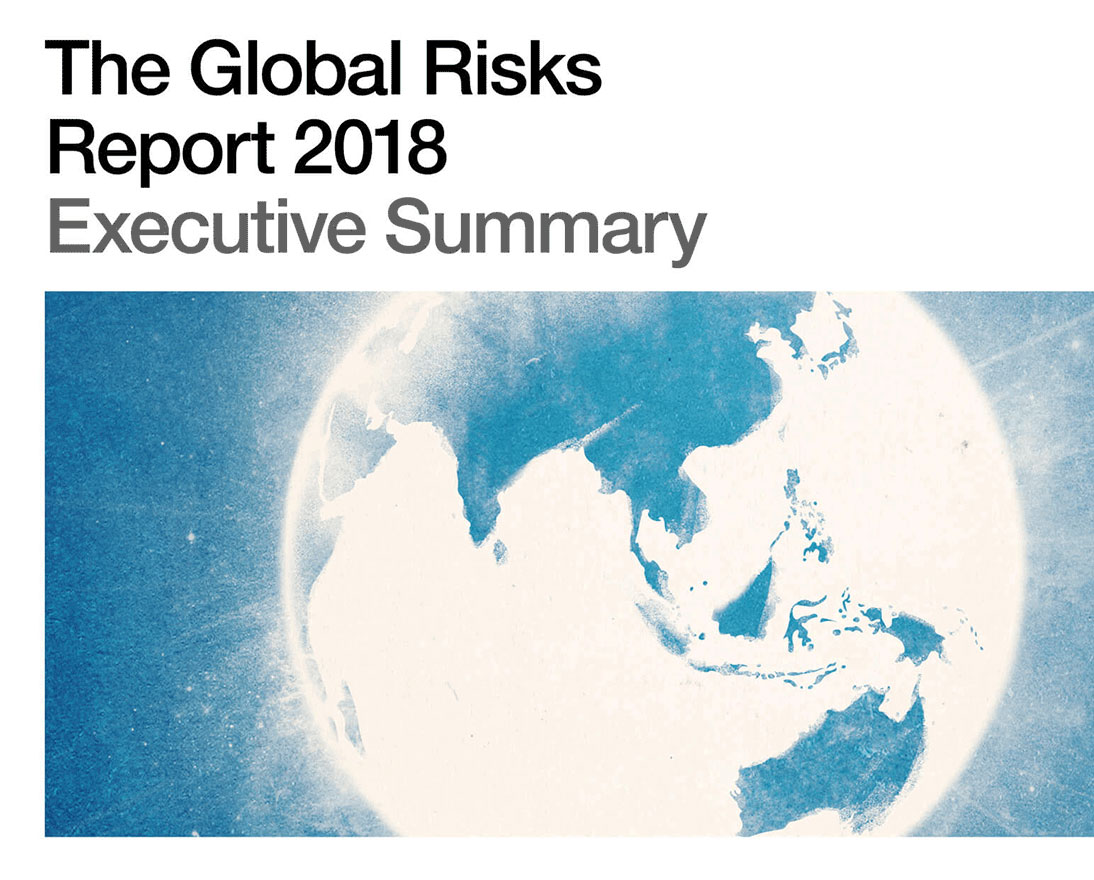
The Global Risks Report 2018
In an era of unprecedented technological, scientific and financial resources, the world continues to live dangerously and the urgency to manage the evolving risks landscape intensifies.

Download the full report here and additional material:
The 13th edition of the Global Risks Report identifies and discusses the many challenges and key risks presented in the year ahead. Living in an era of unprecedented technological, scientific and financial resources, we have an urgent opportunity to manage the evolving global risks landscape, including the increasingly complex systemic risks we face.
In particular, the Report points to several areas of significant concern.
We are pushing our degraded planet to the brink
Environmental risks continue to rise. Environment-related risks again stand out in this year’s global risk landscape with every risk in the category lying in the higher-impact, higher-likelihood quadrant. For the second & consecutive time in thirteen years, the top global risks in terms of likelihood is extreme weather events. Environmental risks, such as these, are intensified by failure of climate change adaptation and mitigation - which is also identified as the most important trend.
Our planet needs protection, urgently, and that protection means we must make a fast transition to a low-carbon economy. Regrettably, we are currently witnessing a too-little-too-late response to climate change.
Our defense against catastrophic cyber risks are being seriously tested
Cyber risks intensified in 2017. Cyber-attacks and massive data fraud both appear within the top five global risks by likelihood.
What's more, while most attacks on critical and strategic infrastructure have not succeeded so far - - the combination of isolated successes along with a growing list of attempted attacks suggests that cyber risks are significantly increasing.
Our growing vulnerability to systemic risks
Until now, we have avoided a system collapse. Yet, the risks we now face are so structural in nature, without a systemic response, our environment, the global economy and other critically important systems may soon face significant challenges.
t is not too late to build a more resilient tomorrow but we need to act with a stronger sense of urgency to avoid a potential system collapse.
Growth alone will not repair the social fabric
Despite the reduced risk rating of economic risks in the Global risks Perception Survey, economic risks remain ever-present and are potential triggers to further systemic consequences.
For example, the continuing increase of income and wealth disparity, the high levels of personal debt and inadequate savings and pension provisions are all factors that may increase risk in the future. In parallel, we should not ignore technological advances and the risk that automation could have disruptive impacts on the labor force, which would fuel further inequality.
The risk of international conflicts are increasing
We also see that clashes related to identity and community continue to drive political dislocations in many countries. These clashes are increasingly fueling cross-border tensions. In addition, polarization continues to remain a source of political, economic and societal risk in Western countries in the near term.
Lastly and perhaps not surprisingly, the current geopolitical risk landscape is exacerbated by the continued decline in commitment to rules-based multilateralism. There is also a great level of concern around the worsening of political and economic confrontations and frictions between major powers.
Future shocks
As the world becomes more complex and interconnected, sudden and dramatic breakdowns—future shocks—become more likely. This new section of the global risks report focus on the possible future shocks that could fundamentally disrupt or destabilize your world, and what can you do to prevent them (including discussions around global supply chain, artificial intelligence, bilateral trade wars, populism, extinction, economic/financial crises, etc.)
How can businesses respond to these global risks?
The increased interconnectivity, complexity and potential impact of global risks are here to stay. In such a context, caring for business and our future means considering everything that could affect it.
Companies need to look at those global risks that could have a direct or indirect impact on their business, and define a holistic approach to managing those risks.
For that, it is important to understand the triggers, trends and scenarios to look out for, and to prepare for the possible consequences.






